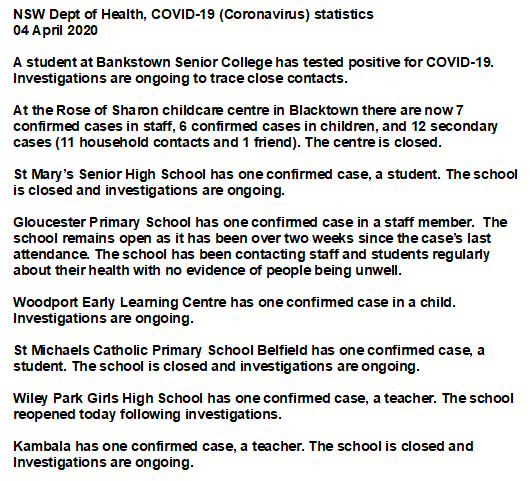In
recent weeks a growing chorus of Australian commentators has called
for social distancing measures to be eased or radically curtailed.
Some
have claimed the lives saved by the lockdowns are not worth the
damage they are causing to the economy.
Others
have claimed the case for easing is strengthened by the fact many of
the hardest hit by COVID-19 are elderly or suffering from other
conditions.
Some
might expect economists, of all people, to endorse this calculus.
But
as economists we categorically reject these views, and we believe
they do not represent the majority of our profession.
We
believe a callous indifference to life is morally objectionable, and
that it would be a mistake to expect a premature loosening of
restrictions to be beneficial to the economy and jobs, given the
rapid rate of contagion…..
Open
Letter from Australian Economists
19
April, 2020
Dear
Prime Minister and Members of the National Cabinet,
The
undersigned economists have witnessed and participated in the public
debate about when to relax social-distancing measures in Australia.
Some commentators have expressed the view there is a trade-off
between the public health and economic aspects of the crisis. We, as
economists, believe this is a false distinction.
We
cannot have a functioning economy unless we first comprehensively
address the public health crisis. The measures put in place in
Australia, at the border and within the states and territories, have
reduced the number of new infections. This has put Australia in an
enviable position compared to other countries, and we must not
squander that success.
We
recognise the measures taken to date have come at a cost to economic
activity and jobs, but believe these are far outweighed by the lives
saved and the avoided economic damage due to an unmitigated
contagion. We believe strong fiscal measures are a much better way to
offset these economic costs than prematurely loosening restrictions.
As
has been foreshadowed in your public remarks, our borders will need
to remain under tight control for an extended period. It is vital to
keep social-distancing measures in place until the number of
infections is very low, our testing capacity is expanded well beyond
its already comparatively high level, and widespread contact tracing
is available.
A
second-wave outbreak would be extremely damaging to the economy, in
addition to involving tragic and unnecessary loss of life.
Sincerely,
Professor
Alison Booth, Australian National University
Professor
Jeff Borland, University of Melbourne
Professorial
Research Fellow Lisa Cameron, Melbourne Institute, University of
Melbourne
Professor
Efrem Castelnuovo, University of Melbourne
Professor
Deborah Cobb-Clark, University of Sydney
Assistant
Professor Ashley Craig, University of Michigan
Professor
Chris Edmond, University of Melbourne
Professor
Nisvan Erkal, University of Melbourne
Professor
John Freebairn, University of Melbourne
Professor
Renée Fry-McKibbin, Australian National University
Professor
Joshua Gans, University of Toronto
Professor
Jacob Goeree, UNSW Business School
Professor
Quentin Grafton, Australian National University
Professor
Simon Grant, Australian National University
Professor
Pauline Grosjean, UNSW Business School
Distinguished
Professor Jane Hall, University of Technology Sydney
Assistant
Professor Steven Hamilton, George Washington University
Professor
Ian Harper, Melbourne Business School
Professor
Richard Holden, UNSW Business School
Professor
David Johnston, Monash University
Professor
Flavio Menezes, University of Queensland
Professor
Warwick McKibbin, Australian National University
Assistant
Professor Simon Mongey, University of Chicago
Professor
James Morley, University of Sydney
Professor
Joseph Mullins, University of Minnesota
Professor
Abigail Payne, Melbourne Institute, University of Melbourne
Professor
Bruce Preston, University of Melbourne
Emeritus
Professor Sue Richardson, Flinders University
Professor
Stefanie Schurer, University of Sydney
Professor
Kalvinder Shields, University of Melbourne
Professor
John Quiggin, University of Queensland
Associate
Professor Simon Quinn, Oxford University
Economic
Advisor James Vickery, Federal Reserve Bank of Philadelphia
Professor
Tom Wilkening, University of Melbourne
Professor
Justin Wolfers, University of Michigan
Professor
Yves Zenou, Monash University
Full
list of signatories available on the economists open letter website.














